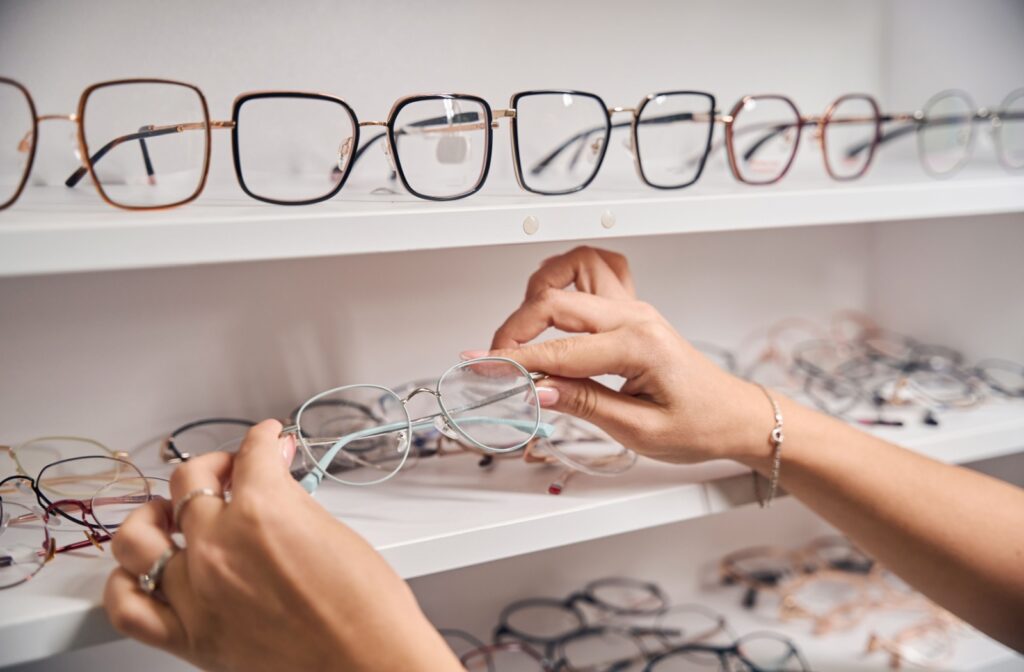When was the last time you updated your glasses prescription? If you’ve been relying on the same pair of lenses for a couple of years or more, it might be time to visit your optometrist. Glasses prescriptions are generally valid for one to two years. Glasses prescriptions aren’t meant to last forever, and for good reason. Recognizing the importance of routine eye exams can not only maintain clear vision but also help to support your long-term eye health.
How Long Does a Glasses Prescription Last?
In Canada, glasses prescriptions are generally valid for one to two years, depending on your age and the health of your eyes. The specific duration may also vary slightly depending on provincial regulations and your optometrist’s recommendations.
As a general guideline:
- Children and teens (6–19 years): should have annual eye exams due to rapid changes in vision during growth.
- Adults (20–64 years): typically require exams every two years unless they have specific eye conditions or vision changes.
- Seniors (65 and older): are encouraged to have their eyes examined once a year due to age-related risks.
These timelines ensure that your glasses continue to meet your visual needs and that any emerging eye health concerns are addressed promptly.
What’s Included in Your Glasses Prescription?
A glasses prescription is more than just a piece of paper; it’s a tailored roadmap for your vision correction. After a comprehensive eye exam, your optometrist will provide a prescription that includes:
- OD and OS: These abbreviations stand for oculus dexter (right eye) and oculus sinister (left eye).
- SPH (Sphere): Indicates the strength needed to correct nearsightedness or farsightedness.
- CYL (Cylinder) and Axis: These values correct astigmatism by adjusting for the curvature of the eye.
- ADD: An additional magnifying power for reading or close-up tasks, often included in prescriptions for multifocal lenses.
In Alberta, a valid prescription will also include your optometrist’s details, your name, the issue and expiration dates, and a signature from your eye care professional.
Why Do Glasses Prescriptions Expire?
Glasses prescriptions expire to protect your vision and overall eye health. While it might seem inconvenient to book an eye exam just to renew your prescription, that expiration date is more than a technicality; it’s a safety measure.
Vision can change slowly over time or more rapidly due to conditions like myopia progression, diabetes, or other eye diseases. Without a current prescription, you risk wearing glasses that no longer accurately correct your vision. This can lead to:
- Blurry or distorted vision
- Eye strain and fatigue
- Headaches
- Difficulty concentrating, especially during reading or computer work
Regular check-ups enable your optometrist to detect early signs of eye conditions that may not exhibit symptoms immediately, such as glaucoma or macular degeneration. These proactive visits help preserve not just your sight, but your quality of life.
What Affects the Longevity of Your Prescription?
Several factors influence how long your prescription remains accurate:
- Age: Children and adolescents typically experience more frequent changes in their vision as they grow.
- Eye conditions: Conditions like astigmatism or progressive myopia may require more frequent updates.
- Lifestyle factors: Increased screen time, exposure to blue light, or new visual demands at work can lead to changes in your prescription needs.
- Lens wear and damage: While scratched or damaged lenses don’t invalidate a prescription, they can reduce your comfort and clarity, which may prompt you to replace your glasses sooner.
Glasses vs. Contact Lens Prescriptions

It’s important to understand that glasses and contact lens prescriptions are not interchangeable. Although they correct for the same visual issues, they are measured differently.
- Glasses sit approximately 12 millimetres away from the eyes.
- Contact lenses sit directly on the eye’s surface.
Because of this, contact lens prescriptions require additional information such as:
- Lens type: whether it’s soft, rigid gas permeable (RGP), or hybrid
- Base curve and diameter
- Fit specifications for your unique eye shape
If you wear both glasses and contacts, you’ll need separate prescriptions for each, both of which should be kept current with regular eye exams.
Signs You May Need a New Prescription
Even if your prescription hasn’t expired yet, specific symptoms can indicate it’s time for a refresh:
- Persistent blurry vision
- Frequent headaches or migraines
- Trouble focusing, especially when reading or using screens
- Eye strain, squinting, or rubbing your eyes often
If you’re noticing any of these signs, don’t wait for your prescription to expire.
Risks of Using an Expired Prescription
Using glasses with an expired or outdated prescription can compromise your daily activities and your safety. Whether you’re driving, working, or enjoying your favourite hobbies, clear and accurate vision is essential.
An outdated prescription can lead to:
- Poor depth perception
- Eye strain or discomfort
- Increased risk of accidents or mistakes
- Unnoticed progression of eye disease
Don’t take the chance. If your prescription has expired, it’s time to schedule an exam.
Protect Your Eyes with Regular Eye Exams in Grande Prairie
We’re here to help you stay on top of your vision needs. Whether you’re due for a routine eye exam, need a new pair of glasses, or have questions about your current prescription, our team is ready to guide you with care. Clear vision starts with regular checkups. If it’s been a year or more since your last eye exam, book an appointment today. We’ll verify that your prescription is accurate and that your eyes are healthy, so you can see the world clearly every day.




